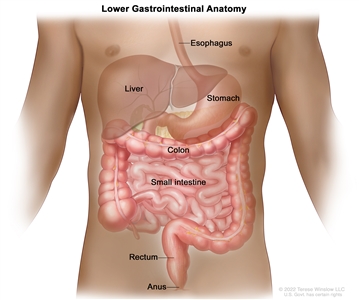Anal Cancer Prevention
Avoiding risk factors and increasing protective factors may help prevent cancer.
Avoiding cancer risk factors may help prevent certain cancers. Risk factors include smoking, having overweight, and not getting enough exercise. Increasing protective factors such as quitting smoking and exercising may also help prevent some cancers. Talk to your doctor or other health care professional about how you might lower your risk of cancer.
The following are risk factors for anal cancer:
Anal HPV infection
Being infected with human papillomavirus (HPV) is the main risk factor for anal cancer. Being infected with HPV can lead to squamous cell carcinoma of the anus, which is the most common type of anal cancer. About nine out of every ten cases of anal cancer are found in patients with anal HPV infection.
People with healthy immune systems are usually able to fight HPV infections. People with weakened immune systems who are infected with HPV have a higher risk of anal cancer.
Certain medical conditions
History of cervical, vaginal, or vulvar cancer
Cervical cancer, vaginal cancer, and vulvar cancer are related to HPV infection. Women who have had cervical, vaginal, or vulvar cancer have a higher risk of anal cancer.
HIV infection/AIDS
Being infected with HIV is a strong risk factor for anal cancer. HIV is the cause of AIDS. HIV weakens the body's immune system and its ability to fight infection. HPV infection of the anus is common among people who are HIV positive.
The risk of anal cancer is higher in men who are HIV positive and have sex with men compared with men who are HIV negative and have sex with men. Women who are HIV positive also have an increased risk of anal cancer compared with women who are HIV negative.
Studies show that intravenous drug use or cigarette smoking may further increase the risk of anal cancer in people who are HIV positive.
Immunosuppression
Immunosuppression is a condition that weakens the body's immune system and its ability to fight infections and other diseases. Chronic (long-term) immunosuppression may increase the risk of anal cancer because it lowers the body's ability to fight HPV infection.
People who have an organ transplant and receive immunosuppressive medicine to prevent organ rejection have an increased risk of anal cancer.
Having an autoimmune disorder, such as Crohn disease or psoriasis, may increase the risk of anal cancer. It is not clear if the increased risk is due to the autoimmune condition, the treatment for the condition, or a combination of both.
Certain sexual practices
The following sexual practices increase the risk of anal cancer because they increase the chance of being infected with HPV:
- Having receptive anal intercourse (anal sex).
- Having many sexual partners.
- Sex between men.
Men and women who have a history of anal warts or other sexually transmitted diseases also have an increased risk of anal cancer.
Cigarette smoking
Studies show that cigarette smoking increases the risk of anal cancer. Studies also show that current smokers have a higher risk of anal cancer than smokers who have quit or people who have never smoked.
The following protective factors decrease the risk of anal cancer:
HPV vaccination
HPV vaccines help protect the body against infection with certain types of HPV. They are used to prevent anal cancer, cervical cancer, vulvar cancer, vaginal cancer, and some other types of cancer caused by HPV. They are also used to prevent abnormal lesions caused by HPV that may lead to some of these cancers.
Studies show that being vaccinated against HPV lowers the risk of anal cancer. The vaccine may work best when it is given before a person is exposed to HPV.
Screening for anal cancer using anoscopy
Cancer screening is looking for cancer before a person has any symptoms. This can help find cancer at an early stage. When abnormal tissue or cancer is found early, it may be easier to treat.
An anoscopy is a procedure that uses a short, lighted tube called an anoscope to check for abnormal areas in the anus and lower rectum.
Studies suggest that using anoscopy to screen for anal cancer could reduce the number of deaths from the disease in people who are HIV positive.
Treatment of anal lesions
Studies show that treatment of anal high-grade squamous intraepithelial lesions (HSIL) decreases the development of anal cancer in people who are HIV positive.
It is not clear if the following protective factor decreases the risk of anal cancer:
Condom use
It is not known if the use of condoms protects against anal HPV infection. This is because not enough studies have been done to prove this.
Cancer prevention clinical trials are used to study ways to prevent cancer.
Cancer prevention clinical trials are used to study ways to lower the risk of developing certain types of cancer. Some cancer prevention trials include healthy people who may or may not have an increased risk of cancer. Other prevention trials include people who have had cancer and are trying to prevent recurrence or a second cancer.
The purpose of some cancer prevention clinical trials is to find out whether actions people take can prevent cancer. These may include eating fruits and vegetables, exercising, quitting smoking, or taking certain medicines, vitamins, minerals, or food supplements.
New ways to prevent anal cancer are being studied in clinical trials.
Information about clinical trials supported by NCI can be found on NCI's clinical trials search webpage. Clinical trials supported by other organizations can be found on the ClinicalTrials.gov website.
